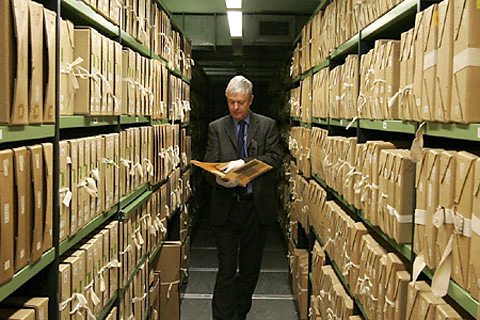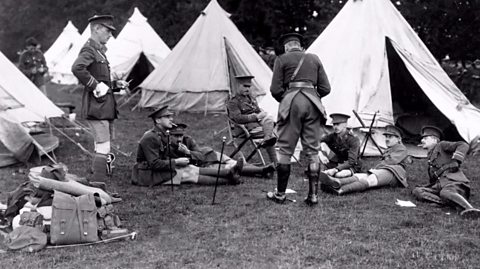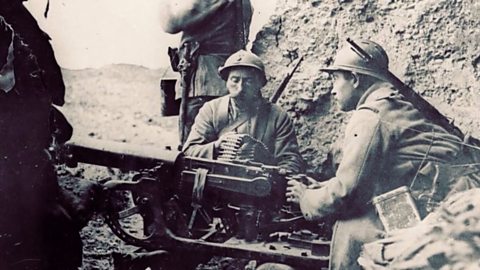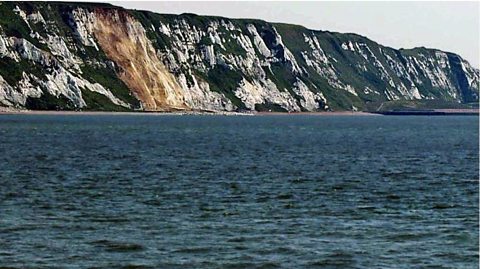Starting your search
World War One is full of stories of sadness, heroism and sacrifice, many of which are still waiting to be told. Nearly 17 million men from across the globe took part in the war – someone in your family may have been one of them.
To start off, ask your older relatives if they know and if they have any family mementos. Even if they don't, just a name and an approximate date and place of birth will be your starting point.
Starting your search
Matt: World War One is full of stories of sadness, heroism and sacrifice. And I was keen to find out what role my family played in the war.
My dad told me about my great-granddad - Tommy Baker. Early on in the war he volunteered to go to the front. Now my dad has told me that he was a cement worker from Hull who signed up to join one the Pal’s Battalions that was raised from the city.
Well, we know that he was in the transport section but really, other than that, our knowledge is pretty sketchy. So today I’m hoping to find out quite a bit more about what Tommy and his pals got up to.
David Bilton is an author who’s written extensively about World War One and the Hull Pals my great-grandfather belonged to.
Matt: Where does the name Hull Pals come from? What’s all that about?
David: Your great-grandfather was from Hull. And he joined the army in Hull. So there’s the first part of it.
There was four and a half thousand men all joined up together but they were linked by streets, by friendship or by occupation, pals. So, like, your great-grandfather could well have walked out from the cement works with two of his friends and said, “Let’s go and sign on now. We’re all from the cement works, we’re all doing the same job, let’s join”.
Matt: Here’s my great-granddad Tommy with his pals in the 11th Tradesmen Battalion. He became a mule man in the transport regiment.
What would have been his role?
David: His role was to make sure that the people that were going to do the fighting had everything that they needed. He would have come over every night and dumped the material in the specific places, so there would be a granade dump, a small arms ammunition dump; there would be a food dump and he would be taking things, and then going back, and each night he would do that.
Matt: And on the very spot David’s brought me to, Tommy was involved in one of the bloodiest battles of World War One, The Battle of Arras, which claimed over 4,000 casualties every day. As a mule man part of his job was to carry the wounded back to safety.
He must have seen some horrific things then.
David: Yes, particularly as he would take the wounded back in the evening, in the dark, when the night came down. They would just put them over the saddle.
Matt: Just lay them over the mules and then just yomp back. God! You just feel so proud… You just feel so proud of what he did.
It has been remarkable finding out what my great-granddad Tommy got up to during the war. And now, you can find out more about the role that your family played in World War One.
Delving into the past
Click or tap on the items below to find out how a soldier's medals, photos or cap badge can help you investigate what he did in World War One.

Looking in the archives
A few basic facts about your relative, such as their name, approximate date of birth, service number or the regiment they served in, can help you narrow down your search.
Search online
The National Archives and ancestry websites have published many records online, such as soldiers' medal cards and service records. The London Gazette, one of the official journals of the British government, has citations of every gallantry award soldiers received in the war. Local newspapers have started digitising their archives and putting them online. You can search them for mentions of your relative or the regiment they belonged to.
Go to the archives
You can also visit local and regimental archives in person. Regimental museums have copies of their battalions’ war diaries. If possible, examine their catalogue online in advance to see what their archive holds. Check whether you will need to bring identification to gain access and to see if they will allow you to copy documents.
Talk to the archivists
When you arrive talk to the archivists. They can be very helpful and explain the best ways to delve into their collections. Don’t set your expectations too high if you are looking for details of an individual. Good investigation takes time and patience and is much more likely to pay off for you if don’t try to rush it.

What Matt found out
Matt Baker took a walk in his great-granddad Tommy's shoes, literally, to find out what it must have been like to transport ammunition and supplies to the front line.
WHAT MATT FOUND OUT
My great-granddad was a mule man in World War One. And he was here in France at the Battle of Arras in 1917.
I want to get some sense of what it would have been like to walk in his shoes. Now these are replicas of World War One boots made to the original design and I am going to try out these size nines. Goodness me! You know your instinct is to put on a nice pair of comfy socks or even shove in the inner soles from these boots, but I’m going to try and make it as authentic as possible.
Tommy had two mules Nelly and Nancy. Today I’ve got Loretta and Lolita. So this is where my great-granddad would have wandered along here, no doubt chatting away like this, to his Nelly and Nancy.
[To the mules] Come on, let’s keep going.
It is the strangest feeling to be here. Sometimes you just… brakes are on.
[To the mules] Let’s back off. A little frightened of the camera?
I’m getting a sense of how men and their mules often formed incredible bonds. I have a feeling of protection here and I just cannot imagine what it must have been like with shells firing and bombs going off. But huddled in here, you know, I’m sure that Tommy felt almost protected by his two mules.
The connection that Tommy must have got with Nelly and Nancy must have been so, so strong and it does give me some kind of comfort that whatever was going on around him and however horrific what he was seeing actually was, you know that gives you some kind of… yeah, I suppose, relief.
[To the mules] Come on then.
Being here and, you know, just walking across the land in the same way that my great-grandfather did, you just want to go back and say I’ve stood there with two mules where he did.
[To the mules] There we are. Thanks for that.
Learn more about this topic:
WW1: Has poetry distorted our view of the war? document
Ian McMillan reads and analyses Wilfred Owen’s poem Dulce et Decorum Est, and asks: do we misunderstand WW1 because we focus on poems like Owen's?

WW1: Why was the first day of the Somme such a disaster? document
The first day on the Somme, 1 July 1916, was the bloodiest day of World War One for the British army. Where did it all go wrong?

WW1: How did Britain handle its biggest wave of refugees ever? document
Britain had to cope with its biggest refugee crisis during WW1. Find out how with actress Rachel Shelley, from BBC Radio 4 WW1 drama series Home Front.
